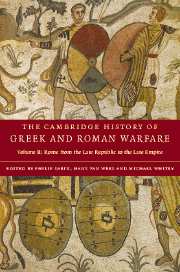Book contents
- Frontmatter
- Part I The Late Republic and the Principate
- Part II The later Roman Empire
- 7 International relations
- 8 Military forces
- 9 War
- 10 Battle
- 11 Warfare and the state
- 12 War and Society
- Chronological table
- Glossary
- List of ancient authors
- Bibliography
- Index of ancient passages cited
- General index
- Map 6. The provinces under Trajan."
- References
12 - War and Society
from Part II - The later Roman Empire
Published online by Cambridge University Press: 28 March 2008
- Frontmatter
- Part I The Late Republic and the Principate
- Part II The later Roman Empire
- 7 International relations
- 8 Military forces
- 9 War
- 10 Battle
- 11 Warfare and the state
- 12 War and Society
- Chronological table
- Glossary
- List of ancient authors
- Bibliography
- Index of ancient passages cited
- General index
- Map 6. The provinces under Trajan."
- References
Summary
For inhabitants of the early Empire, the Roman army was a somewhat distant feature of society. Garrisoned in large fortresses whose barracks accommodated the vast majority of troops and often supplied by military workshops, the army would have seemed a world set apart. Its separation from the civilian world would have been emphasized all the more by the fact that most of these fortresses were stationed in frontier areas away from the main centres of population. Therefore for most of those living in the empire everyday contact with the army was minimal and a matter of choice, for while the dilectus or enforced levy was a legal possibility it was rarely used. Troops were volunteers and this lack of enforced recruitment suggests a high degree of satisfaction with a soldier’s lot. Many veterans retired into respectability in various communities around the empire.
Oddly, this highly professional, and somewhat hermetically sealed, world was run by amateurs. Throughout Roman history arms and politics had been inextricably mixed; no ambitious Roman would wish to miss out on the possibility of military glory. Yet this glory was set very firmly into the context of a broader political career. Apart from the wobble of A.D. 68/9 which was resolved by the rapid emergence of the Flavian dynasty, Cicero’s maxim of ‘let arms yield to the toga’ found its most perfect expression in the early Principate when the army was of no weight in political matters. Before the death of Pertinax in A.D. 193 only Nero had met his death as the consequence of a military uprising.
- Type
- Chapter
- Information
- The Cambridge History of Greek and Roman Warfare , pp. 424 - 458Publisher: Cambridge University PressPrint publication year: 2007
References
- 1
- Cited by



